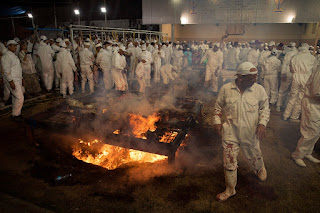As
many of you as were baptized into Christ have
clothed yourselves with Christ.
There
is no longer Jew or Greek, there
is no longer slave or free,
there
is no longer male and female; for
all of you are one in Christ Jesus.
Galatians 3:27-28 NRSV
A few months ago I read about a Roman Catholic priest in Arizona who was in the doctrinal penalty box because he made a mistake in the wording for the baptismal formula which was noticed by the family of the candidate being baptized. Instead of saying "I baptize you in the name of the Father, and the Son and the Holy Spirit" he made the colossal error of saying "We baptize you...". This was not an act of rebellion on the part of the priest. To keep the metaphor going, this would be the equivalent of unintentionally firing the puck over the boards, resulting in a penalty.
Wait, there's more! The priest has now resigned from his duties and thousands of baptisms he conducted have been invalidated. And so are subsequent confirmations and marriages. This is astonishing, given that all these baptisms were done in the name of the Triune God. This is not just an expulsion from the game, every fan in the stands was kicked out as well (hey, I couldn't resist.)
Another priest commented that the Vatican was treating the traditional words of baptism like a computer password without which you can't get into the Church. Other "defenders of the faith" insist that these words are sacrosanct and must be precise.
This is not the first time the issue of what will be said in accompaniment of the action of baptism has been addressed, although this just seems nuts (a theological term.) The United Church has wrestled with this over time, beginning in the mid-1970's, and thoughtfully it seems to me.
Ultimately the UCC came out of the church-wide discussion with this:
One of the key elements in The Celebration of Baptism or The Renewal of Baptismal Faith is a declaration of faith made by the candidate or on their behalf. The baptismal vows offered in this resource reflect an understanding of baptism as both a gift from God and call to Christian discipleship. While the order and wording of the vows may vary according to context, it is important that they reflect the following core elements:
a. profession of faith in the triune God;
b. commitment to seek justice and resist evil;
c. commitment to follow the way of Jesus Christ;
d. commitment to the mission and ministry of the Church.
And this:
In 2000 the Judicial Committee of the United Church ruled
that “a Remit is required to alter the wording of the baptismal formula in The
Basis of Union, section 2.16.1.” In keeping with this ruling, the following
service uses the traditional Trinitarian formula in The Act of Baptism. In
keeping with established General Council policy on just and inclusive language,
it also provides for the optional use of a variety of Trinitarian blessings
following Baptism in the Name of the Triune God.
Through the years I led discussions in congregations about baptism and while I was open to alternatives in language, if requested (that happened just once), I used the traditional formula.
Honestly, I'm appalled by what's happened to the "heretic" priest and all those who were baptized by him through the years. Somehow this sacrament of God's grace and inclusion in the Body of Christ has been turned into this nightmare. For all my commitment to ecumenism, when I hear about this sort of hierarchical, patriarchal nonsense I'm so glad I'm not a Roman Catholic.
Before conscious thought or action on our part,
we
are born into the brokenness of this world.
Before conscious thought or action
on our part,
we
are surrounded by God’s redeeming love.
Baptism by water in the name of the
Holy Trinity
is
the means by which we are received, at any age,
into
the covenanted community of the church.
It is the ritual that signifies our
rebirth in faith
and
cleansing by the power of God.
Baptism signifies the nurturing,
sustaining,
and
transforming power of God’s love
and
our grateful response to that grace.
A Song of Faith -- UCC -- 2006
























